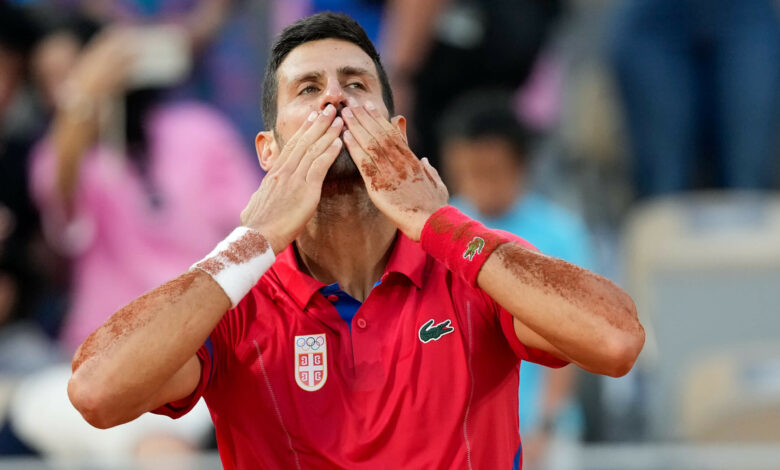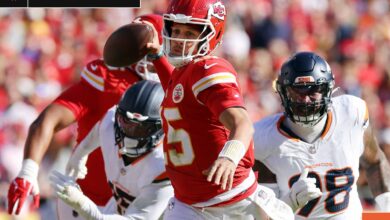Djokovic prepares for gold medal fight with Alcaraz

There they go again.
For the second time in three weeks, Novak Djokovic and Carlos Alcaraz will battle it out for one of tennis’ biggest prizes when they meet for the gold medal at Roland Garros on Sunday. It’s the latest chapter in their intergenerational duel, with the man who tops the all-time tennis rankings taking on the young buck who currently rules the roost.
Logic dictates that there is not much time left for this kind of fight, especially not at the Olympics. Djokovic is 37. Ageless as he may seem, it is hard to imagine a duel with Alcaraz in Los Angeles in four years with a gold medal on the line, but you can bet he won’t let it go.
Alcaraz, 21 years old and already a leader, especially this spring and summer, seems to have a decade or more of superiority to gain.
On Sunday, they’ll do something increasingly rare, even in the short time they’ve met at the top of the sport. They’ll play for a prize that neither has, and it’s not a title at some random tour stop in Basel where they both happen to be.
For Djokovic, the gold medal is the rare tennis gem that somehow doesn’t sit on a mantelpiece filled with 24 Grand Slam titles, not in doubles or mixed doubles. A solitary singles bronze from 2008 is all he has to show for his four previous Olympic appearances.
He has been playing professional tennis for 20 years. He has played 49 Grand Slam semifinals and won 37. Until Friday night against Lorenzo Musetti of Italy, he had never won one at the Olympics. When he did, with a final, hard forehand down the line, he fell on his back into the red clay.
He clenched his fists and tried to hold back his tears, but lost them as Serbian flags were waved and the crowd chanted: “NOVAK, NOVAK!”
It cannot be overstated how much this tournament means to him, especially when you consider that two months ago it seemed like a pipe dream when he tore his meniscus on this court and underwent surgery and a rapid rehabilitation that both jeopardized and saved his summer.
For Alcaraz, it is the next hardware accumulation that will allow him, as he put it last month at Wimbledon, to “sit at that table” with Djokovic and the rest of the greats. He has a chance to become one of three players to win the French Open, Wimbledon and the Olympic tournament in the same year. Rafael Nadal and Steffi Graf are the others.
““Two legends of the sport,” Alcaraz said. “I’ll try not to think about every statistic, about the things I could achieve.”
On Friday he played as if he already had a seat at that table, or perhaps even owned it, beating Felix Auger Aliasime 6-1, 6-1 with a fearsome ferocity he has only recently developed, especially in the latter stages of tournaments.
In the blazing sun and oppressive humidity of Roland Garros on Friday, both sets followed a pattern down to the last detail, as if Alcaraz had planned them. Lose a game on the return; win a game on serve. In the second set, the other way around. Then drag Auger-Aliassime around the court for five games, messing up his game plan until he comes up with new ideas as he should, but none of them work, getting more and more confused until he looks over the net and it’s 1-5 and it’s over.
He did essentially the same thing to Auger-Aliassime, a deceptively good clay court player, on this court in the fourth round of the French Open in June. Auger-Aliassime is just 23, just a few years removed from the time he was considered destined for major titles. Now he faces years of Friday-like afternoons. Not fun.
““I knew I had to start the match well, really focus on every point and play with a lot of intensity,” Alcaraz said. “I didn’t think it would be like this.”
Djokovic played a different kind of tennis that was always great. He survived an increasingly dangerous opponent one night after a few missteps left him wondering if he had hurt his knee again during his quarterfinal win over Stefanos Tsitsipas. “Very worried,” he had said, after suffering severe pain during that match that was only relieved with the help of painkillers.
His knee was examined on Friday, but he appeared to be able to move freely all night. On Thursday he said he planned to “ Pray to God that everything will be okay.” Those prayers were apparently answered.
Djokovic and Musetti, who played in the semifinals of Wimbledon last month, played two hours of full-throttle, big-boy tennis. Djokovic’s chest rose after points. He was forced to take extra time to catch his breath, receiving a warning and a penalty, and then a code violation warning after an altercation with the chair umpire.
This is what stressed Djokovic looks like, Djokovic desperately wanting something, something rare and unknown, wanting it so badly that his nerves are starting to drain his energy. He repeatedly shouted at his Serbian coaches and teammates to make more noise and give him the boost he needed.
Musetti was with him until the final points of the first set. He hit an easy putaway right back and Djokovic, who hit it back and somehow won the point. A sloppy drop shot from Musetti gave Djokovic the lead he so rarely relinquishes, and he didn’t do that on Friday, despite losing his serve twice in the second set.
He knows what’s coming, a test against the best of, as he half-mockingly calls it, “the next, next, next, generation,” his shorthand for noticing how many have already been there, only to have them beaten away by him. He knows that Alacaraz (and the injured Italian Jannik Sinner) are different, playing at a level he hasn’t been able to reach all year.
He knows he has to get there somehow and convince himself it’s possible, just as he once convinced himself he could overtake Nadal and Roger Federer. It’s the only way to get just about the one thing he doesn’t have.
Additional reporting by James Hansen
(Daniela Porcelli/Eurasia Sport Images/Getty Images)




